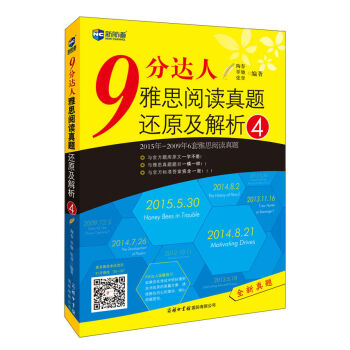

具体描述
产品特色
编辑推荐
适读人群 :雅思考生及英语学习爱好者《9分阅读5》 PK 《剑1-11》
《剑1-11》所收录真题已被剔除出雅思考试现行题库,未来考试中不会再考,而本书所收录真题为近两年高频考题,极有可能出现在未来任何一场考试中!此外,本书相较《剑1-11》,还有配套题目解析、分段词汇解析、参考范文等,更方便考生进行学习和巩固。
《9分阅读5》 PK 《9分阅读1、2、3、4》
本书精选2016年-2012年6套完整阅读真题,与9分阅读1、2、3、4均不重合。考生需要知道的是,这五本书的题目均在雅思考试现行题库中,其命中率相当,都极有可能出现于未来的考试中!如有时间,建议将这五本书的题目都刷一遍。
《9分阅读5》 PK 市面其他同类图书
本书所收录真题原文与官方题库原文高度吻合,与真实考试题目如出一辙,与官方所给答案相差无几!本书凭借高度还原性及惊人的命中率赢得了广大“烤鸭”一致认可!
内容简介
《9分达人雅思阅读真题还原及解析5》是《9分阅读》系列的新成员,是作者的又一呕心沥血之作。本书的编排特色主要有以下几个方面:
一、2016年-2012年6套雅思阅读真题完整收录。
本书收录了2016年-2012年6套完整的全新雅思阅读真题,“烤鸭”们可通过本书在考前调整好心态,进行适当的训练。
二、各套真题部分添加各个Passage的考试日期。
不同于该系列之前出版的图书,本书首次尝试将各个Passage新考过的日期放置在该题开始,方便考生了解各部分题目的考试日期,了解新的考试动态。
三、“词汇详解”版块顺序调整。
值得一提的是,我们在编写《9分阅读5》这本书时充分考虑到部分读者对于记忆阅读真题词汇的需求,相较以往“词汇详解”中的重点词汇只在“参考译文”原文部分以加粗形式呈现,这次则是将词汇调整至译文之后编排,方便“烤鸭”前后对照记忆。
四、详尽的真题解读与分析,手把手传授经验与技巧。
首先,本书结合题目与原文对每一道阅读题目进行了详细的解读。内容清晰明了,通俗易懂。可帮助“烤鸭”们既知其然又知其所以然。其次,解析中还汇聚了有效的解题思路、方法和技巧,有助于“烤鸭”们从技术层面把握好考试节奏。相信“烤鸭”们在掌握好这些方法、技巧后能更从容地应对雅思阅读考试。总之,“烤鸭”们须细心揣摩,读透吃透,如此才能将书本上的知识化为己用。
五、“《9分阅读》系列出版至今命中题目一览”首次呈现。
鉴于“烤鸭”们对于《9分达人》系列命中率有着强烈的好奇心,本书我们将以阅读系列为例,首次将其命中的日期以表格形式呈现给各位。
作者简介
新航道雅思研发中心,是新航道国际教育集团教学管理部下属的研发机构,汇集新航道雅思教学一线名师,善于将一线教学经验与所研发产品相结合,其出版的辅导用书能够充分把握雅思考试的命题规律,紧跟考试动态,实用高效。到目前为止,已自主研发雅思考试类辅导用书百逾种,数百万雅思考生开卷有益,赢得了数百万读者的高度认同!
内页插图
目录
Test 1 1
Test 2 16
Test 3 32
Test 4 47
Test 5 61
Test 6 78
真题解析Test 95
真题解析Test 127
真题解析Test 159
真题解析Test 188
真题解析Test 222
真题解析Test 257
Answer Keys 285
附录1 本书所收集文章及对应考试日期一览 291
附录2 《9 分阅读》系列出版至今命中题目一览 292
精彩书摘
TEST 1READING PASSAGE 1 2016年4月21日
You should spend about 20 minutes on Questions 1-13, which are based on Reading Passage 1 below.
What the Managers Really Do?
When students graduate and first enter the workforce, the most common choice is to find an entry-level position. This can be a job such as an unpaid internship, an assistant, a secretary, or a junior partner position. Traditionally, we start with simpler jobs and work our way up. Young professionals start out with a plan to become senior partners, associates, or even managers of a workplace. However, these promotions can be few and far between, leaving many young professionals unfamiliar with management experience. An important step is understanding the role and responsibilities of a person in a managing position. Managers are organisational members who are responsible for the work performance of other organisational members. Managers have formal authority to use organisational resources and to make decisions. Managers at different levels of the organisation engage in different amounts of time on the four managerial functions of planning, organising, leading, and controlling.
However, as many professionals already know, managing styles can be very different depending on where you work. Some managing styles are strictly hierarchical. Other managing styles can be more casual and relaxed, where the manager may act more like a team member rather than a strict boss. Many researchers have created a more scientific approach in studying these different approaches to managing. In the 1960s, researcher Henry Mintzberg created a seminal organisational model using three categories. These categories represent three major functional approaches, which are designated as interpersonal, informational and decisional.
Introduced Category 1: INTERPERSONAL ROLES. Interpersonal roles require managers to direct and supervise employees and the organisation. The figurehead is typically a top of middle manager. This manager may communicate future organisational goals or ethical guidelines to employees at company meetings. They also attend ribbon-cutting ceremonies, host receptions, presentations and other activities associated with the figurehead role. A leader acts as an example for other employees to follow, gives commands and directions to subordinates, makes decisions, and mobilises employee support. They are also responsible for the selection and training of employees. Managers must be leaders at all levels of the organisation; often lower-level managers look to top management for this leadership example. In the role of liaison, a manager must coordinate the work of others in different work units, establish alliances between others, and work to share resources. This role is particularly critical for middle managers, who must often compete with other managers for important resources, yet must maintain successful working relationships with them for long time periods.
Introduced Category 2: INFORMATIONAL ROLES. Informational roles are those in which managers obtain and transmit information. These roles have changed dramatically as technology has improved. The monitor evaluates the performance of others and takes corrective action to improve that performance. Monitors also watch for changes in the environment and within the company that may affect individual and organisational performance. Monitoring occurs at all levels of management. The role of disseminator requires that managers inform employees of changes that affect them and the organisation. They also communicate the company’s vision and purpose.
Introduced Category 3: DECISIONAL ROLES. Decisional roles require managers to plan strategy and utilise resources. There are four specific roles that are decisional. The entrepreneur role requires the manager to assign resources to develop innovative goods and services, or to expand a business. The disturbance handler corrects unanticipated problems facing the organisation from the internal or external environment. The third decisional role, that of resource allocator, involves determining which work units will get which resources. Top managers are likely to make large, overall budget decisions, while middle managers may make more specific allocations. Finally, the negotiator works with others, such as suppliers, distributors, or labor unions, to reach agreements regarding products and services.
Although Mintzberg’s initial research in 1960s helped categorise manager approaches, Mintzberg was still concerned about research involving other roles in the workplace. Minstzberg considered expanding his research to other roles, such as the role of disseminator, figurehead, liaison and spokesperson. Each role would have different special characteristics, and a new categorisation system would have to be made for each role to understand it properly.
While Mintzberg’s initial research was helpful in starting the conversation, there has since been criticism of his methods from other researchers. Some criticisms of the work were that even though there were multiple categories, the role of manager is still more complex. There are still many manager roles that are not as traditional and are not captured in Mintzberg’s original three categories. In addition, sometimes, Mintzberg’s research was not always effective. The research, when applied to real life situations, did not always improve the management process in real-life practice.
These two criticisms against Mintzberg’s research method raised some questions about whether or not the research was useful to how we understand “managers” in today’s world. However, even if the criticisms against Mintzberg’s work are true, it does not mean that the original research from the 1960s is completely useless. The author did not say Mintzberg’s research is invalid. His research has two positive functions to the further research.
The first positive function is Mintzberg provided a useful functional approach to analyse management. And he used this approach to provide a clear concept of the role of manager to the researcher. When researching human behavior, it is important to be concise about the subject of the research. Mintzberg’s research has helped other researchers clearly define what a “manager” is, because in real-life situations, the “manager” is not always the same position title. Mintzberg’s definitions added clarity and precision to future research on the topic.
The second positive function is Mintzberg’s research could be regarded as a good beginning to give a new insight to further research on this field in the future. Scientific research is always a gradual process. Just because Mintzberg’s initial research had certain flaws, does not mean it is useless to other researchers. Researchers who are interested in studying the workplace in a systematic way have older research to look back on. A researcher doesn’t have to start from the very beginning—Older research like Mintzberg’s have shown what methods work well and what methods are not as appropriate for workplace dynamics. As more young professionals enter the job market, this research will continue to study and change the way we think about the modern workplace.
Questions 1-6
Look at the following discriptions or deeds (Questions 1-6) and the list of categories
below.
Match each description or deed with the correct category, A, B or C.
Write the correct letter, A, B, or C, in boxes 1-6 on your answer sheet.
NB You may use any letter more than once.
List of Categories
A INTERPERSONAL ROLES
B INFORMATIONAL ROLES
C DECISIONAL ROLES
1 the development of business scheme
2 presiding at formal events
3 using employees and funds
4 getting and passing message on to related persons
5 relating the information to employees and organisation
6 recruiting the staff
……
前言/序言
本书特色
《9分阅读》系列出版至今即将迎来第7个年头,从《9分达人雅思阅读真题还原及解析》到《9分达人雅思阅读真题还原及解析5》,我们一步步改进,不断完善,不仅为
大家还原出了更多历年雅思考试阅读真题,总结了雅思阅读各类题型的解题技巧和方法,提供了全面的题目解读和分析,还为广大“烤鸭”们打造了一册又一册的押题宝典!
《9分达人雅思阅读真题还原及解析5》是继《9分达人雅思阅读真题还原及解析4》之后《9分阅读》系列的又一名成员,是作者的又一呕心沥血之作。在本书的创作过
程中,作者投入了大量精力,从细心筛选雅思机经试题并加以还原,到精心编著真题解析、反复打磨,无不体现了作者的细心思量和良苦用心。在历经反复雕琢后,现终
于成熟。我们相信,《9分达人雅思阅读真题还原及解析5》将继续为广大“烤鸭”们的“留学梦”奉献出自己的一份力量,帮助“烤鸭”们进行考前冲刺复习,扩充雅思
阅读词汇储备,找到真实的考场体验,习得精炼的解题方法和技巧,延续《9分阅读》系列的押题神话!
本书的编排特色主要有以下几个方面:
一、2012年-2016年6套雅思阅读真题完整收录。
本书收录了2012年-2016年6套完整的雅思阅读真题,“烤鸭”们可通过本书在考前调整好心态,进行适当的训练。本书所收录的6套阅读真题与《9分达人雅思阅读真
题还原及解析》《9分达人雅思阅读真题还原及解析2》《9分达人雅思阅读真题还原及解析3》《9分达人雅思阅读真题还原及解析4》所收录的真题均不重合。考生可根据自己
的实际情况选做其中的题目,再对照解析部分查漏补缺,巩固已有的知识和经验,加深对雅思考试考点的印象和理解。
二、各套真题部分添加各个Passage的考试日期。
不同于该系列之前出版的图书,本书首次尝试将各个Passage最新考过的日期放置在该题开始,方便考生了解各部分题目的考试日期,了解最新的考试动态。
三、“词汇详解”版块顺序调整。
本书沿用了《9分达人雅思阅读真题还原及解析4》的四大版块,它们分别为:“真题集”“词汇详解”“题目详解”和“参考译文”。其中,“真题集”收录了2012年-2016年6套阅读真题;“词汇详解”汇总了阅读文章中的重难点词汇的释义及相关拓展;“题目详解”则是6套阅读真题的详尽解析。值得一提的是,我们在编写《9分阅读5》这本书时充分考虑到部分读者对于记忆阅读真题词汇的需求,相较以往“词汇详解”中的重点词汇只在“参考译文”原文部分以加粗形式呈现,这次则是将词汇调整至译文之后编排,方便“烤鸭”前后对照记忆。
“词汇详解”部分的使用方法有三:1.正常做完一套题后使用(较为推荐)。“烤鸭”将书中题目当做考前“模考”使用,能够比较直观反映自身真实水平,方便对做真题暴露的种种问题制定解决方案。在最后分析总结阶段可帮助各位分析是否是因为词汇问题导致理解错误选错了答案,这样更有助于加深对文章和词汇的理解记忆。2.做题之前先熟悉或学习所有词汇。这适用于备战时间短、只期望将此书作为押题宝典的“烤鸭”。该词汇详解可作为“难词表”字典,方便阅读时遇到不熟悉的词汇进行对照查找,更快地找出答案。3.把该部分单独拿出来当词汇书使用。如果备战时间够长,必要时,“烤鸭”可将这部分裁切下来随身携带记忆。通过词汇的学习和相对应的雅思文章阅读来提高自己的单词和阅读实力,达到“以考促学”的效果。
四、详尽的真题解读与分析,手把手传授经验与技巧。
首先,本书结合题目与原文对每一道阅读题目进行了详细的解读。内容清晰明了,通俗易懂,可帮助“烤鸭”们既知其然又知其所以然。其次,解析中还汇聚了最有效的解题思路、
方法和技巧,有助于“烤鸭”们从技术层面把握好考试节奏。相信“烤鸭”们在掌握好这些方法、技巧后能更从容地应对雅思阅读考试。总之,“烤鸭”们须细心揣摩,读透吃透,如此才能将书本上的知识化为己用。
五、“《9分阅读》系列出版至今命中题目一览”首次呈现。
《9分阅读》系列的“考场押题技能”是毋庸置疑的,相信诸多“烤鸭”已深有体会。在考场中,人品爆发的“烤鸭”或许会惊喜地发现手中的雅思阅读题竟然与本书中的题目一模一样!鉴于“烤鸭”们对于《9分达人》系列命中率有着强烈的好奇心,本书我们将以阅读系列为例,首次将其命中的日期以表格形式呈现给各位。
当然,我们并不完全提倡“烤鸭”单纯地以此为押题宝典。如时间充裕,务必请各位“烤鸭”把本书内容吃透了,不然即便在考场上碰到原题,也未必能运用自如。毕竟,书中的内
容只有化为脑海中的知识,才能帮助“烤鸭”们笔锋指处,所向披靡!为方便“烤鸭”们互通有无、分享经验、结伴同行,也为更好地了解“烤鸭”们的真实需求,切实服务广大读者,我们建立了新航道雅思读者互动QQ群(群号见封底)及9分达人微信(“9分达人”二维码见封面),诚邀“烤鸭”们和英语爱好者加入,与志同道合者一起交流心得、畅所欲言!如果您对我们有任何意见或建议,也请不要忘记告诉我们!我们会认真对待每一位读者的意见和提议,不断改善、不断进步,为大家推出更优秀的图书!
最后,我们衷心祝愿“烤鸭”们取得优异的成绩,实现自己的“留学梦”!
编者
2017年1月
用户评价
在讲解方法论这一点上,这本书展现出了它作为一本资深辅导材料的深度。很多市面上的资料都是“告诉”你怎么做,这本书却是“展示”给你看它是如何做到的。我特别喜欢它在解析疑难文章时所采用的“多维度解析法”。它不仅仅停留在中文翻译层面,而是会用图形化的方式来梳理长段落的内在逻辑结构,比如用箭头表示因果关系,用方框圈出转折点。这种视觉化的辅助工具,对于我这种非母语学习者理解复杂论证至关重要,一下子就能把那些散落在文本中的信息点串联起来,形成一个清晰的思维导图。更别提它对“同义替换”的处理,简直是一本活的“高频词汇替换词典”,它会把原文中的一个核心词汇,列出在不同语境下可能出现的五到六种不同表述方式,并标注其语域(学术、日常、正式等),这种细致入微的积累,让我感觉自己不再是孤军奋战地去背单词,而是被手把手地拉进了“考官思维模式”。
评分这本书的章节逻辑安排得简直是为我这种“细节控”量身定做的学习路径图。我最欣赏它在初期处理基础题型时那种层层递进的布局。它没有一上来就抛出那些晦涩难懂的复杂长难句或逻辑陷阱,而是先从最基础的“定位词抓取”和“主旨句识别”这些核心技能入手,通过大量的精选案例来反复操练,直到我形成肌肉记忆。每完成一个小模块的学习后,都会有一个小结性的测试,这个设计非常巧妙,它能即时反馈我是否真正掌握了刚刚学到的技巧,而不是等到一整套做完才发现方向跑偏了。特别是它对不同阅读题型(比如是非题、配对题、填空题)的解析,不是简单地给出答案和对应原文,而是深入剖析了出题者设置陷阱的心理,那种“庖丁解牛”式的拆解分析,让我每次看都有一种醍醐灌顶的感觉,明白了为什么有的选项“看起来对,但就是错”。这种结构化的学习体验,极大地降低了学习曲线的陡峭程度,让原本觉得高不可攀的雅思阅读难度,变得触手可及。
评分这本书的配套资源使用体验,绝对是加分项中的重头戏。我这个人有一个坏习惯,就是特别依赖听力材料的辅助,哪怕是阅读题,我也会尝试去“听”文章的语调和停顿,以更好地捕捉作者的语气和重点。这本书的音频文件,无论是发音的清晰度还是语速的把控,都达到了专业水准,简直无可挑剔。更重要的是,它对文章的朗读速度进行了细致的划分,有慢速的精读版,确保你能听清每一个细微的词汇变化;也有接近真实考试速度的正常版,用于模拟临场压力。而且,我注意到它在解析部分,一些关键的逻辑跳转点,音频中会特别强调重音和停顿,这有效地弥补了纯文字解析中那种“平铺直叙”的枯燥感。这种多媒体的整合,让学习过程不再是单向的信息灌输,而变成了一种沉浸式的语言环境体验,极大地提升了学习效率和趣味性。
评分真正让我感到震撼的,是这本书对“错题分析与追踪”这一环节的重视程度。很多时候,我们做完一套题,对一下答案,错了就过去了,但这本书却提供了一个系统化的自我诊断框架。它不只是简单地告诉你“你选C错了,因为正确答案是B”,它会引导你思考:“你为什么会倾向于C?”比如,它会分析我的错误是出在“时间概念混淆”上,还是“否定词理解偏差”上。在每一套模拟测试的最后,都附带了一个详细的“错误类型统计表”,要求读者根据自己的失分点,回头去回顾之前学过的哪些核心技巧没有用对。这种自我反思和循环强化的机制,迫使我必须正视自己的弱点,而不是沉迷于做题的数量。这种注重“内功修炼”而非“题海战术”的教学理念,让我明白,真正的提分不是靠刷一百套卷子,而是靠吃透十套卷子背后的原理,这本书的设计哲学完美契合了高效备考的最高境界。
评分这本书的包装和印刷质量简直没得挑!首先,从我拿到手的那个瞬间起,我就被它厚实的纸张和清晰的排版所吸引。那种油墨的质感,拿在手里沉甸甸的,感觉就是一本精心制作的教辅材料,而不是那种随便印印就拿出来糊弄人的东西。内页的出血位处理得非常专业,翻阅起来手感极佳,长时间学习眼睛也不会感到疲劳,这对于我们这种需要对着阅读材料好几个小时的人来说,简直是救命稻草。而且,装帧的牢固度也让我印象深刻,我习惯把书摊开放在桌上做笔记,很多书用几次边角就开始松动,这本书的锁线装订非常结实,我敢保证它能陪我度过整个备考周期,甚至以后作为参考书收藏起来也不会有任何问题。封面设计虽然不算那种让人惊艳的艺术品,但那种稳重、专业的蓝色调,配上醒目的标题字体,一眼就能看出它的定位——实打实的应试工具书,没有多余的花哨,一切都以学习效率为最高标准,这种务实作风我很欣赏。可以说,光是它的物理形态,就给我注入了一针“这本教材靠谱”的强心剂,让人在开始啃那些复杂的阅读文章之前,心情就舒畅了不少。
评分经典书籍,很不错,开始复习了,加油
评分吾消费京东商城数年,深知各产品琳琅满目。然,唯此宝物与众皆不同,为出淤泥之清莲。使吾为之动容,心驰神往,以至茶饭不思,寝食难安,辗转反侧无法忘怀。于是乎紧衣缩食,凑齐银两,倾吾之所有而能买。东哥之热心、快递员之殷切,无不让人感激涕零,可谓迅雷不及掩耳盗铃儿响叮当仁不让世界充满爱。待打开包裹之时,顿时
评分好评(o^^o)好 o(# ̄▽ ̄)==O)) ̄0 ̄")o 金钢飞拳~!!
评分9分达人,烤鸭必备!希望以此能过
评分可以可以可以可以可以可以
评分可以可以可以可以可以可以可以
评分开阔思路,很受益
评分这件商品。
评分考雅思需要的书,应该好
相关图书
本站所有内容均为互联网搜索引擎提供的公开搜索信息,本站不存储任何数据与内容,任何内容与数据均与本站无关,如有需要请联系相关搜索引擎包括但不限于百度,google,bing,sogou 等
© 2026 book.idnshop.cc All Rights Reserved. 静思书屋 版权所有








![清华中学英语分级读物:中学生百科英语1(Facts & Figures,附CD-ROM光盘1张) [Reading & Vocabulary Development 1 Facts & Figures] pdf epub mobi 电子书 下载](https://pic.tinynews.org/11419597/55eea0f0N4c9a4902.jpg)






![彼得兔经典故事集3:小松鼠蒂米(赠优美英文故事朗读光盘) [3-6岁] [The Tale of Peter Rabit] pdf epub mobi 电子书 下载](https://pic.tinynews.org/11397890/rBEhVlLfbs4IAAAAAAPcjtJrhqgAAIPdgIZiUMAA9ym654.jpg)


![每天读点英文:获奖感言全集 [Everyday English Snack Famous Acceptance Speeches] pdf epub mobi 电子书 下载](https://pic.tinynews.org/11372110/rBEhVVKyrXMIAAAAAAM0x0KXS1MAAHGtwPHpGgAAzTf823.jpg)
![彼得兔经典故事集1:小兔彼得(赠优美英文故事朗读光盘) [3-6岁] pdf epub mobi 电子书 下载](https://pic.tinynews.org/11397884/rBEhVlLfa88IAAAAAANjxf5jMGoAAIPaQMVVYcAA2Pd025.jpg)
![全新英语阅读:六年级·完形填空与首字母填空 [English Reading Comprehension Series] pdf epub mobi 电子书 下载](https://pic.tinynews.org/11895672/56fb8758N78b7bcb9.jpg)